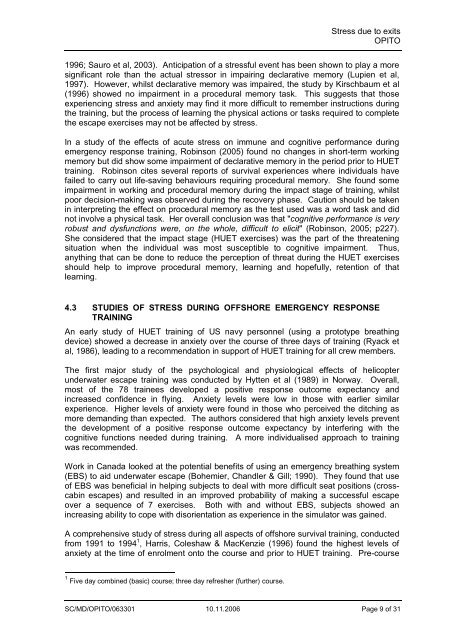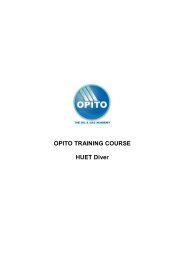Stress levels associated with huet - Opito
Stress levels associated with huet - Opito
Stress levels associated with huet - Opito
Create successful ePaper yourself
Turn your PDF publications into a flip-book with our unique Google optimized e-Paper software.
<strong>Stress</strong> due to exits<br />
OPITO<br />
1996; Sauro et al, 2003). Anticipation of a stressful event has been shown to play a more<br />
significant role than the actual stressor in impairing declarative memory (Lupien et al,<br />
1997). However, whilst declarative memory was impaired, the study by Kirschbaum et al<br />
(1996) showed no impairment in a procedural memory task. This suggests that those<br />
experiencing stress and anxiety may find it more difficult to remember instructions during<br />
the training, but the process of learning the physical actions or tasks required to complete<br />
the escape exercises may not be affected by stress.<br />
In a study of the effects of acute stress on immune and cognitive performance during<br />
emergency response training, Robinson (2005) found no changes in short-term working<br />
memory but did show some impairment of declarative memory in the period prior to HUET<br />
training. Robinson cites several reports of survival experiences where individuals have<br />
failed to carry out life-saving behaviours requiring procedural memory. She found some<br />
impairment in working and procedural memory during the impact stage of training, whilst<br />
poor decision-making was observed during the recovery phase. Caution should be taken<br />
in interpreting the effect on procedural memory as the test used was a word task and did<br />
not involve a physical task. Her overall conclusion was that "cognitive performance is very<br />
robust and dysfunctions were, on the whole, difficult to elicit" (Robinson, 2005; p227).<br />
She considered that the impact stage (HUET exercises) was the part of the threatening<br />
situation when the individual was most susceptible to cognitive impairment. Thus,<br />
anything that can be done to reduce the perception of threat during the HUET exercises<br />
should help to improve procedural memory, learning and hopefully, retention of that<br />
learning.<br />
4.3 STUDIES OF STRESS DURING OFFSHORE EMERGENCY RESPONSE<br />
TRAINING<br />
An early study of HUET training of US navy personnel (using a prototype breathing<br />
device) showed a decrease in anxiety over the course of three days of training (Ryack et<br />
al, 1986), leading to a recommendation in support of HUET training for all crew members.<br />
The first major study of the psychological and physiological effects of helicopter<br />
underwater escape training was conducted by Hytten et al (1989) in Norway. Overall,<br />
most of the 78 trainees developed a positive response outcome expectancy and<br />
increased confidence in flying. Anxiety <strong>levels</strong> were low in those <strong>with</strong> earlier similar<br />
experience. Higher <strong>levels</strong> of anxiety were found in those who perceived the ditching as<br />
more demanding than expected. The authors considered that high anxiety <strong>levels</strong> prevent<br />
the development of a positive response outcome expectancy by interfering <strong>with</strong> the<br />
cognitive functions needed during training. A more individualised approach to training<br />
was recommended.<br />
Work in Canada looked at the potential benefits of using an emergency breathing system<br />
(EBS) to aid underwater escape (Bohemier, Chandler & Gill; 1990). They found that use<br />
of EBS was beneficial in helping subjects to deal <strong>with</strong> more difficult seat positions (crosscabin<br />
escapes) and resulted in an improved probability of making a successful escape<br />
over a sequence of 7 exercises. Both <strong>with</strong> and <strong>with</strong>out EBS, subjects showed an<br />
increasing ability to cope <strong>with</strong> disorientation as experience in the simulator was gained.<br />
A comprehensive study of stress during all aspects of offshore survival training, conducted<br />
from 1991 to 1994 1 , Harris, Coleshaw & MacKenzie (1996) found the highest <strong>levels</strong> of<br />
anxiety at the time of enrolment onto the course and prior to HUET training. Pre-course<br />
1 Five day combined (basic) course; three day refresher (further) course.<br />
SC/MD/OPITO/063301 10.11.2006 Page 9 of 31




